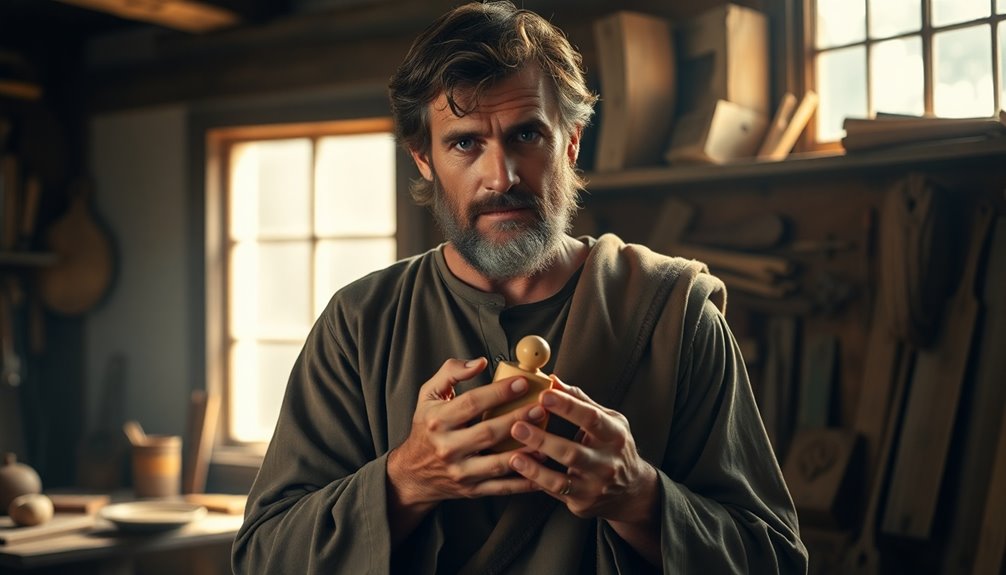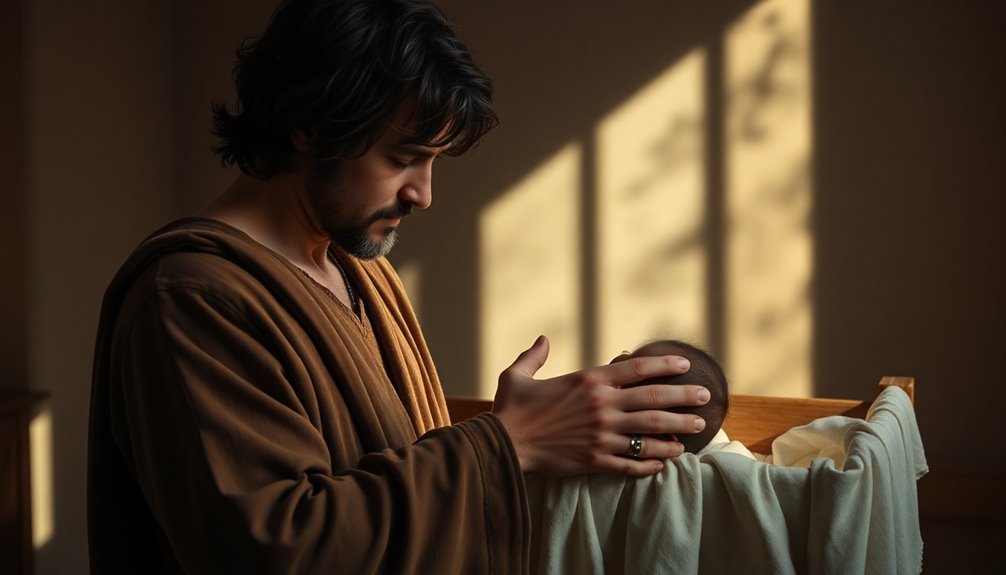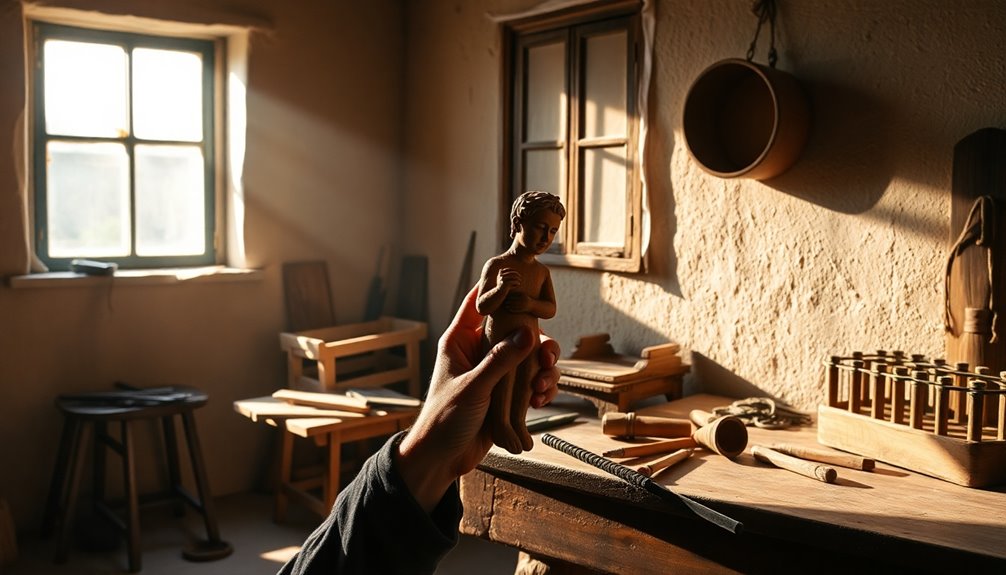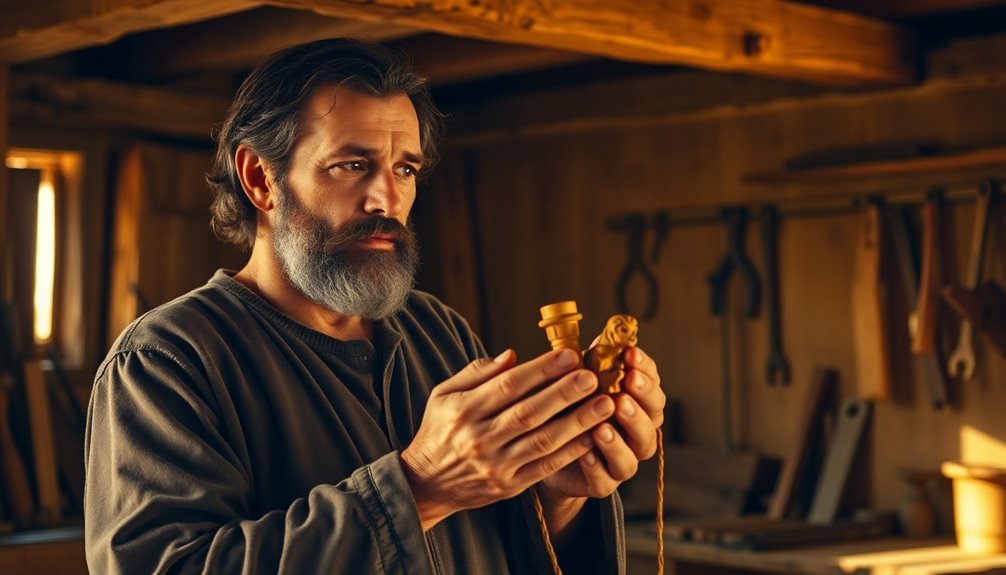Joseph, the father of Jesus, showcases unwavering faith and humility in a challenging situation. He accepted Mary's unexpected pregnancy and followed God's guidance after an angel visited him in a dream. His lineage connects to King David, fulfilling prophecies about the Messiah. In a time when fatherhood came with immense societal pressures, Joseph's nurturing presence helped shape Jesus' identity. His commitment to integrity and responsibility is a model for modern-day fathers. Joseph's unique role continues to inspire discussion about fatherhood and spiritual leadership. Discovering more about his life will unveil deeper insights into his contributions and legacy.
Key Takeaways
- Joseph is recognized as Jesus' earthly father, embodying quiet strength and unwavering faith throughout Jesus' upbringing.
- He is of royal lineage traced back to King David, fulfilling the prophecy of the Messiah's descent.
- Joseph's obedience to divine guidance, including marrying Mary and naming Jesus, showcases his commitment to God's mission.
- His role as a provider and protector emphasizes the importance of fatherhood and family in first-century Jewish society.
- Celebrated as a model of fatherhood, Joseph's legacy inspires modern discussions on spiritual leadership and nurturing family relationships.
Introduction

When you think about the Holy Family, Joseph often stands out as a figure of quiet strength and unwavering faith. As the earthly father of Jesus, his role is crucial, not just as a caretaker but as a moral compass for both Mary and Jesus.
Joseph's lineage traces back to King David, which firmly roots him in God's plan. His character is marked by humility and integrity, qualities that shine through when he learns of Mary's pregnancy. Initially, he considers divorcing her quietly to protect her from public disgrace but chooses to follow God's guidance after an angel appears to him in a dream.
While you might notice Joseph's limited presence during Jesus' adult life, his influence is profound. He provides a model of faithfulness and responsibility that shapes Jesus' upbringing.
This foundation of love and protection is vital as Jesus grows into his divine mission. In honoring Joseph, the Church recognizes him as the patron saint of fathers and workers, with March dedicated to his feast days.
Through his actions, Joseph embodies the ideals of fatherhood, reminding us of the enduring strength found in faith and commitment to family.
Joseph's Lineage in Scripture

When you explore Joseph's lineage in Scripture, you'll find two distinct genealogies in Matthew and Luke.
Matthew emphasizes his royal connection through Solomon, while Luke traces his ancestry back to Nathan, linking Jesus to all of humanity.
These differences prompt fascinating discussions about Joseph's role and the implications for Jesus' identity as the Messiah.
Primary Bible References
Joseph's lineage is a crucial aspect of understanding his role in the Nativity story and the fulfillment of biblical prophecy. In the Gospels, you find two key genealogies that trace Joseph, the earthly father of Jesus.
Matthew's account, found in Matthew 1:1-16, emphasizes Joseph's royal heritage, tracing his line from Abraham through King David. This lineage highlights the fulfillment of the Old Testament prophecy that the Messiah would come from David's line, specifically noted in Jeremiah 23:5.
On the other hand, Luke's genealogy, presented in Luke 3:23-38, takes a broader approach by tracing Joseph's lineage back to Adam. This not only affirms Joseph's descent from David but also underscores the universal significance of Jesus' birth.
The differing genealogies reflect Jewish custom and the distinct audiences of each Gospel writer—Matthew catering to a Jewish audience and Luke to Gentiles. Furthermore, Joseph is described as a "just man" in Matthew 1:19, showcasing his righteousness and commitment to Jewish law, especially as he navigated the complexities surrounding the Virgin Mary and the miraculous circumstances of Jesus' conception.
Secondary Bible References
The genealogies in Matthew and Luke not only trace Joseph's lineage but also highlight important theological implications. In Matthew 1:1-16, you see Joseph connected to King David through Solomon, establishing his legal claim to the Davidic line. This fulfills Old Testament prophecies, like Isaiah 11:1, that the Messiah would emerge from David's lineage. Even though Jesus was conceived by the Holy Spirit, Matthew emphasizes Joseph's role as His legal father, reinforcing the significance of his lineage.
On the other hand, Luke 3:23-38 presents a genealogy that likely reflects the biological lineage of Mary and includes Joseph, indicating his vital role in Jesus' family heritage.
This duality in the genealogies serves to affirm Jesus' identity as the Messiah. By tracing Joseph's lineage through both Solomon and Nathan, these accounts not only validate Jesus' royal heritage but also illuminate the broader narrative of salvation history.
Thus, Joseph's lineage is crucial in understanding the fulfillment of prophecies surrounding the Messiah and the divine plan that connects both Mary and Joseph within the story of Jesus.
First-Century Jewish Family Life

Family life in first-century Jewish culture was deeply rooted in traditions and communal values, forming a vital part of daily existence. As the father to Jesus and husband of Mary, Joseph exemplified the essence of Jewish family life, adhering closely to Jewish law. His betrothal to Mary was more than just an agreement; it was a binding contract that came with social expectations and legal implications.
When he learned of Mary's pregnancy, he navigated this challenging situation with care, showcasing his commitment to family integrity.
In a Jewish household, the father held the crucial role of provider and protector, which Joseph fulfilled through his carpentry work. He safeguarded Mary and Jesus from societal judgment and dangers, illustrating his dedication to their well-being.
Joseph also took his responsibilities seriously regarding the religious upbringing of Jesus. Taking him to the temple for dedication reflected a deep commitment to instilling faith.
Additionally, Joseph's actions demonstrated the importance of community. He cooperated with extended family and neighbors, emphasizing that strong familial and communal bonds were vital for stability in their lives during that time.
Joseph's Role in Prophecy

In many ways, Joseph played a crucial role in fulfilling biblical prophecies about the Messiah. As a descendant of King David, his lineage is vital because it aligns with the prophecy that the Messiah would come from David's line (Matthew 1:1-16). This connection underscores Jesus' rightful place as the anticipated Savior.
Joseph's involvement in the Holy Family during Jesus' early life reflects prophecies about the Messiah's humble beginnings in Nazareth, as indicated in Isaiah 11:1. When the angel instructed Joseph in a dream to name Mary's son Jesus (Matthew 1:21), it connected to the prophecy in Isaiah 7:14, where "Immanuel" means God with us.
Moreover, Joseph's decision to flee to Egypt to protect Jesus from King Herod's massacre fulfilled Hosea 11:1, which states, "Out of Egypt, I called my son."
His obedience and faithfulness in responding to divine commands highlight his pivotal role in ensuring these prophecies surrounding Jesus' birth and early life were realized. Joseph's actions weren't just protective; they were prophetic, affirming the divine plan at work in the Holy Family's journey.
Joseph's Marital Status Misconceptions

You might think of Joseph simply as Mary's husband, but his marital status is more complicated than it seems.
Legally betrothed yet facing societal pressures, he struggled with expectations of fatherhood when he discovered Mary's pregnancy.
Understanding these dynamics helps clarify the misconceptions surrounding his role in Jesus' life and their family structure.
Address Joseph's Marital Status
Joseph's marital status has sparked various misconceptions throughout history. While he was indeed betrothed to Mary, this relationship was a legally binding commitment in Jewish culture.
It's important to note that they didn't live together until after Jesus' birth, as indicated in Matthew 1:18-25. The Gospels suggest that Joseph refrained from marital relations with Mary until then, showcasing his respect for her virginity (Matthew 1:25).
Some traditions argue that Joseph might've been a widower with children from a prior marriage, while others interpret Jesus' siblings as cousins or close relatives (Matthew 13:55-56). This leads to the theological concept of Joseph's perpetual virginity, emphasizing his unique role as the adoptive father of Jesus, the son of David.
Moreover, various apocryphal writings depict Joseph as a much older man, which further supports the notion of Mary's perpetual virginity.
These diverse interpretations contribute to the ongoing debate about Joseph's marital status, but at the core, his relationship with Mary remains a testament to their commitment and devotion to each other and their divine mission.
Cultural Expectations of Fatherhood
While navigating the complexities of fatherhood in first-century Jewish society, societal expectations placed immense pressure on men like Joseph. Betrothed to Mary when she became pregnant, Joseph faced potential disgrace and judgment, as cultural expectations demanded honor and integrity. His initial choice to divorce Mary quietly reflects the weight of these expectations, aiming to protect both their reputations.
However, upon receiving divine instruction, Joseph embraced a path that defied conventional norms by marrying Mary, showcasing his faith and commitment.
Although Joseph wasn't Jesus' biological father, his role emphasizes the importance of paternal presence. He became a nurturing figure in Jesus' life, illustrating that fatherhood transcends biological ties.
This portrayal of Joseph as a righteous man who obeyed divine guidance counters the stigma surrounding marital status misconceptions of his time. By stepping into a role that society might've deemed inappropriate, Joseph redefined fatherhood, demonstrating that true righteousness lies in love, support, and the willingness to follow a higher calling.
His story challenges you to consider the deeper meanings of fatherhood beyond societal expectations.
Fatherhood in Modern Contexts

When you think about fatherhood today, it's clear that it shapes your identity in profound ways.
In faith communities, the role of a father extends beyond mere provision; it's about spiritual guidance and connection.
Fatherhood's Impact on Identity
Fatherhood plays a crucial role in shaping a child's identity and sense of self, often acting as a cornerstone for emotional and spiritual development. Just look at Joseph, the earthly father of Jesus. His presence and protective guidance highlight how fatherhood transcends biological connections.
By embodying obedience and selflessness, Joseph showcases the impact a nurturing father figure can have on a child's emotional growth and resilience against societal challenges.
In your role as a father, you can draw inspiration from Joseph's legacy. He reminds us that fatherhood is a sacred vocation, encouraging you to embrace your responsibilities as a spiritual leader and role model within your family.
Through consistent, faith-driven actions, you can profoundly influence your children's values and character, fostering a strong sense of identity.
Consider the challenges Joseph faced, such as the stigma surrounding Jesus' birth. These struggles resonate with many fathers today, emphasizing the need for compassion, integrity, and faithfulness in parenting.
Fatherhood in Faith Communities
Many modern faith communities recognize the vital role fathers play in shaping not just their children's lives but also the spiritual fabric of their families. In these contexts, fatherhood is often viewed as a sacred vocation, where you're called to nurture your family both spiritually and emotionally, much like Joseph did. His example of obedience and commitment to God's plan serves as a powerful model for fathers today.
You'll find that many faith traditions celebrate Joseph's virtues—integrity, humility, and selflessness—integrating them into discussions about fatherhood. These discussions highlight the spiritual role of fathers as protectors and guides, especially amid today's societal challenges. By looking to Joseph's story, you're encouraged to trust in divine guidance and prioritize your family's well-being.
To further support this journey, various religious organizations promote fatherhood workshops and mentorship programs inspired by Joseph's life. These initiatives aim to equip you with the tools needed to fulfill your role as a spiritual leader within your family.
In doing so, faith communities foster a nurturing environment that strengthens both fathers and their families, creating a lasting spiritual legacy.
Joseph's Enduring Legacy Endures

The legacy of Joseph, the earthly father of Jesus, continues to resonate deeply within Christian tradition. Revered as a model of fatherhood, Joseph exemplifies obedience, humility, and protective love. His commitment to Mary and Jesus highlights that presence and dedication matter more than mere biological ties. You'll find that his role as the earthly guardian of Jesus is a powerful reminder of the essential qualities of paternal care.
Joseph's lineage as a descendant of King David enriches the theological significance of his contributions to Jesus' life and mission. Celebrating St. Joseph on feast days like March 19 emphasizes his influence on our understanding of fatherhood and family responsibilities. His life inspires you to embrace the virtues of integrity and compassion in your own parenting journey.
In a world where the concept of fatherhood is often debated, Joseph's legacy stands firm, guiding discussions on spiritual leadership and the importance of nurturing relationships within families.
Additional Resources

Exploring additional resources can deepen your understanding of Joseph's role in the life of Jesus and the broader significance of his legacy. You might start by reading the Gospels of Matthew and Luke, which provide essential insights into Joseph's lineage and his protective actions as a father.
These accounts highlight his unwavering obedience to the Holy Spirit's guidance, particularly when he accepted Mary as his wife after an angel appeared to him.
Consider examining theological texts that discuss Joseph's virtues, such as humility and integrity, which resonate with the values of modern families. Reflecting on his role in Jesus' upbringing can offer a fresh perspective on fatherhood today.
Art and literature often depict Joseph in ways that emphasize his paternal care, making these mediums valuable for understanding his character.
Additionally, look into Church teachings that explain Joseph's significance in fulfilling Old Testament prophecies, reinforcing his importance in the narrative of salvation history.
Frequently Asked Questions
What Is Known About Joseph, the Father of Jesus?
You might know that Joseph, a humble and obedient man, played a crucial role in his family's life. He received divine guidance through dreams, helping him protect those he loved.
As a carpenter, he provided for his family while instilling values of integrity and faithfulness. His legacy emphasizes paternal responsibility, serving as a powerful model for fatherhood.
Interestingly, he's mentioned in the Gospels, but his last appearance comes when Jesus was just twelve years old.
How Many Children Did Joseph Jesus' Father Have?
You might be curious about how many children a certain Joseph had.
According to various interpretations of historical texts, he'd at least six children. This includes four sons named James, Joseph, Simon, and Judas, along with two daughters whose names remain unknown.
The exact nature of their relationships can vary, with some viewing them as siblings while others suggest they could be cousins.
The details about these children can be quite intriguing!
Why Did God Choose Joseph to Be the Father of Jesus?
God chose Joseph to be the father of Jesus because of his righteous character and obedience.
You can see how he immediately followed divine instructions, showing his commitment to God's will. His lineage as a descendant of King David fulfilled prophecies, making him a fitting choice.
Why Does Joseph Have Two Fathers?
You might notice that some genealogies list two fathers for the same person, which can seem confusing.
This often reflects different traditions or legal versus biological lines. In ancient cultures, it's common to emphasize both the official lineage and familial ties.










